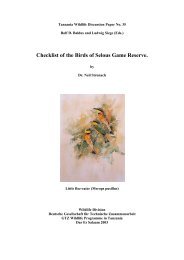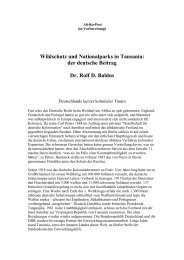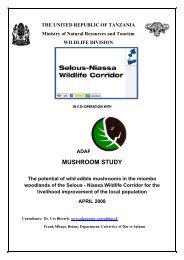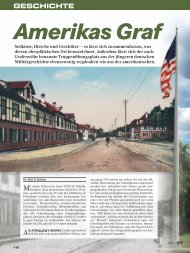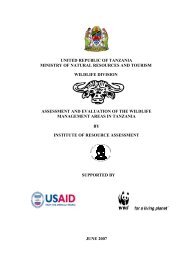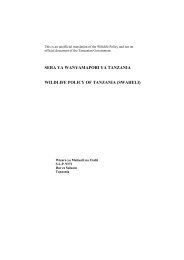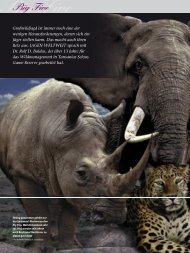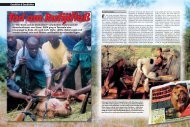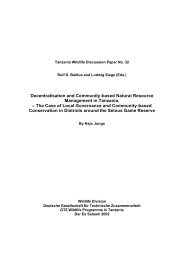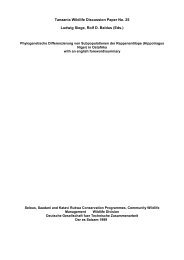African Indaba Articles - wildlife-baldus.com
African Indaba Articles - wildlife-baldus.com
African Indaba Articles - wildlife-baldus.com
You also want an ePaper? Increase the reach of your titles
YUMPU automatically turns print PDFs into web optimized ePapers that Google loves.
Not many members of the South <strong>African</strong> hunting and angling <strong>com</strong>munity look like stereotypicalenvironmentalists and unfortunately hunters and non-hunting conservationists often make each othernervous. In the past the lack of <strong>com</strong>munication, irresponsible media reporting as well as irresponsiblebehavior of people from both camps created trenches once thought unbridgeable.It is certainly true that the two groups may not see eye-to-eye on every issue, but what connects them isan understanding that healthy ecosystems mean healthy habitats for game animals. This has lead to somesort of cooperation even between such diverse organizations as the Sierra Club and the National RifleAssociation.In South Africa, where hunting has driven the establishment of over 9,000 registered game ranches,covering over 16 million hectares, which is nearly three times the area covered by all the provincial andnational game reserves in the country, such cooperation is still sadly lacking.Hunting and non-hunting conservation groups in South Africa need to recognize their <strong>com</strong>mon objectivesand their natural alliance. Initial steps have been made, but the process is painfully slow.A lot of paranoia still exists on both sides. With the hunters, because hunting has been beaten savagely forso long; not only by the few extreme animal rightists, but by the media and as a result by an underinformedsociety in general. With many conservation organizations, because they perceive that the more extremeanimal rights organizations will have a field day in poaching their members, if they associate too closely withhunters. WWF’s caveat at the end of the published hunting policy is significant proof: “WWF does not run orderive revenue from any trophy hunting projects”. Nevertheless, in Namibia, WWF-LIFE was instrumental inestablishing the hunting concessions for the Khwe <strong>com</strong>munity in the Bwabwata National Park, and WWF-Pakistan assists remote rural <strong>com</strong>munities in establishing trophy hunting programs.Another example is a recent move in South Africa to put game ranching under the umbrella of theDepartment of Agriculture. Game Ranchers celebrate the “South <strong>African</strong> conservation revolution” and their16 million hectares of private conservation areas, but fail to see that the “revolution” has just begun andneeds to be expanded with a triple-bottom-line approach and not a shortsighted focus on economics. OnlyDEAT can provide the structure and drive for that.Partnerships in innovative approaches, clear norms & standards, effective self-administration and enablingtax legislation are needed to maintain and increase the conservation acreage. Eventually this may leadtowards larger conservancies with joint management plans.Fence-sitting behavior by either party plays into the hands of those who want to discredit the entireenvironmental movement. The South <strong>African</strong> conservation NGOs need to publicly clarify that, albeit some oftheir members might be against hunting, institutionally they are not. They must take a stand for the sake ofour wild natural heritage, and they have to <strong>com</strong>e out in public together with their foremost allies – thehundred thousands South <strong>African</strong> hunters and anglers and their associations.We have to stop allowing a few uninformed oddballs and card carrying members of the Flat-Earth-Society, in either camp, to be stumbling blocks to a true Natural Partnership.Scientists and Hunters Meet in LondonBy Gerhard R DammThe Sustainable Use Specialist Group (SUSG) under the IUCN Species Survival Commission and theZoological Society of London invited interested stakeholders and the public to a symposium „RecreationalHunting, Conservation and Rural Livelihoods: Science and Practice“ in mid October at the ZoologicalSociety’s London headquarters. The purpose of the meeting was to examine recreational hunting as aconservation tool and to explore how recreational hunting can be a significant partner in global <strong>wildlife</strong>conservation.About 260 persons followed the invitation to the symposium. The event was co-organized by theInternational Council for Game and Wildlife Conservation (CIC) and Fauna Flora International (FFI). Primaryfunding for the conference came from organizations like Conservation Force, Dallas Safari Club, Safari ClubInternational and Sand County Foundation. Opening the meeting SUSG Chair Jon Hutton said “this meetingbreaks new scientific ground because for the first time we have brought together leading experts and99



